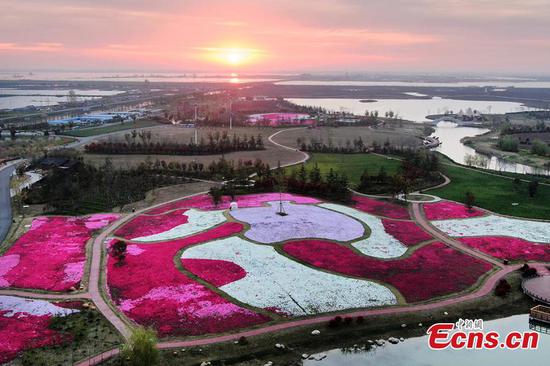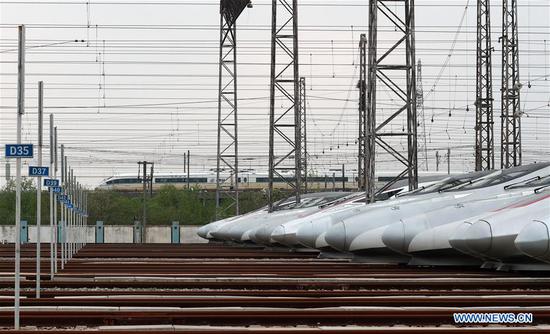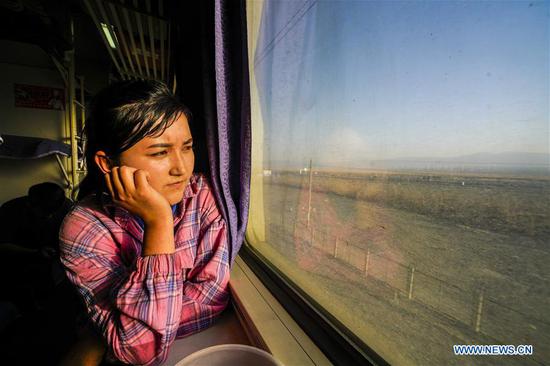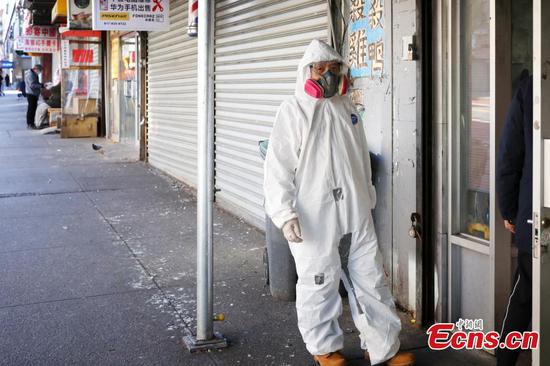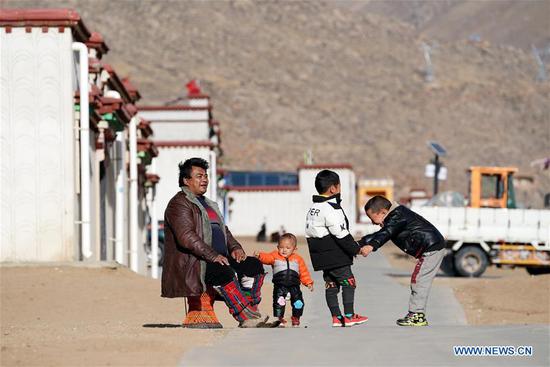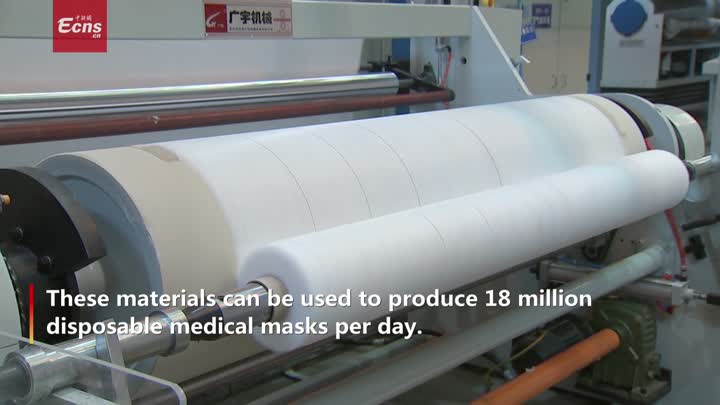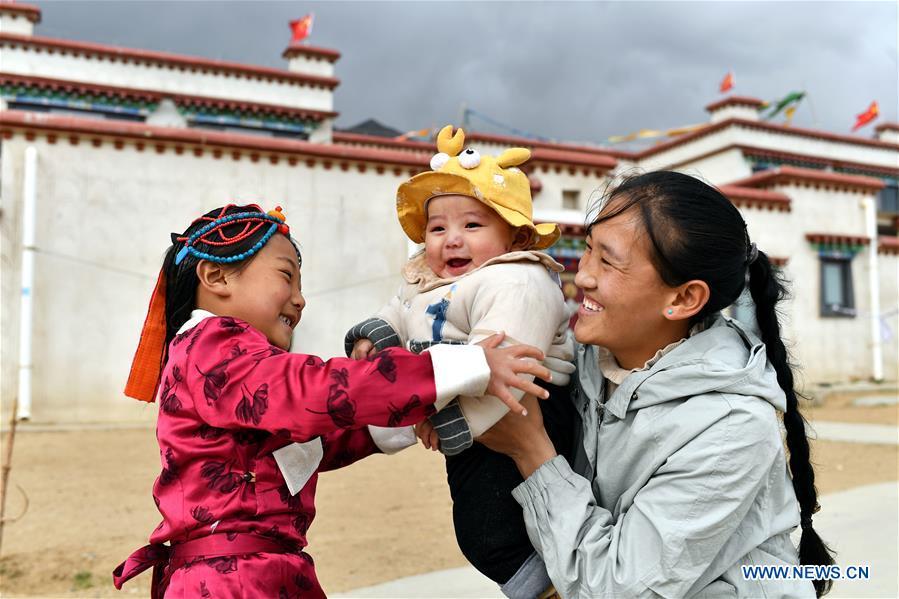
Shizhen plays with her daughter Gesang Quda and son Gama Quying at the Rongma relocation settlement in Gurum Township of Lhasa, capital of southwest China's Tibet Autonomous Region, April 1, 2020. In 2018, more than 1,000 shepherds moved from Qiangtang grassland with an average altitude of about 5,000 meters in Rongma Township of Nagqu City to the Rongma relocation settlement, 30 kilometers west of Lhasa, thanks to the local policy on poverty alleviation. This measure also makes room for the living of wild animals at the Qiangtang National Nature Reserve. With the help of local government, the relocated people have developed the cultivation industry of yaks and sheep and other special pasture-style projects, thus increasing their incomes. (Xinhua/Zhan Yan)
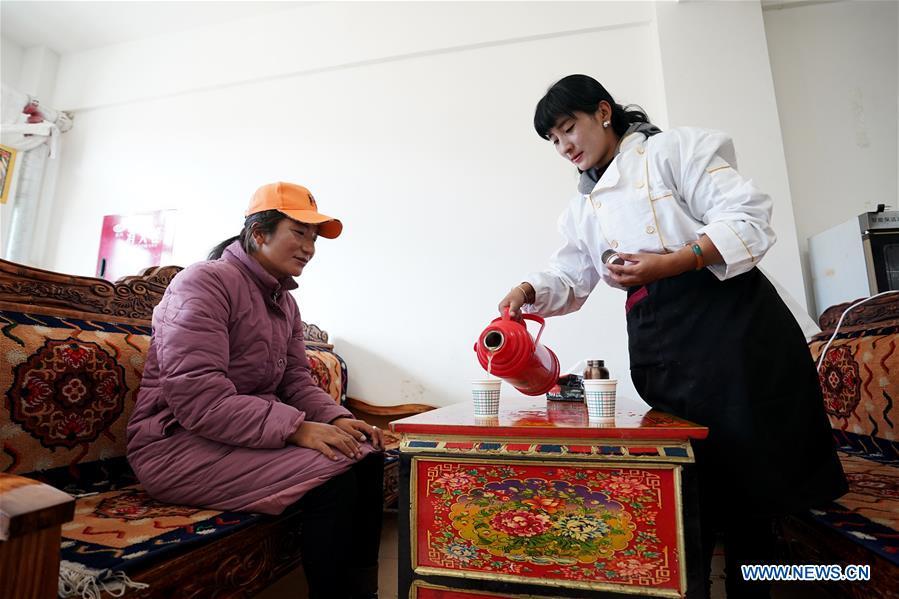
Dazhen serves tea for a customer at her teahouse at the Rongma relocation settlement in Gurum Township of Lhasa, capital of southwest China's Tibet Autonomous Region, April 2, 2020. In 2018, more than 1,000 shepherds moved from Qiangtang grassland with an average altitude of about 5,000 meters in Rongma Township of Nagqu City to the Rongma relocation settlement, 30 kilometers west of Lhasa, thanks to the local policy on poverty alleviation. This measure also makes room for the living of wild animals at the Qiangtang National Nature Reserve. With the help of local government, the relocated people have developed the cultivation industry of yaks and sheep and other special pasture-style projects, thus increasing their incomes. (Xinhua/Zhan Yan)
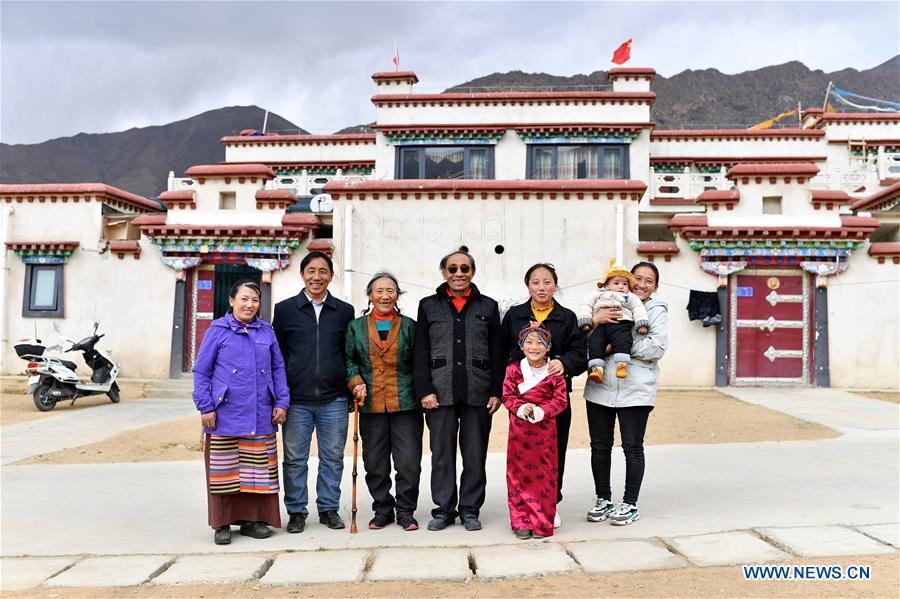
Dunzhu (2nd L) and his family members pose for a photo in front of their house at the Rongma relocation settlement in Gurum Township of Lhasa, capital of southwest China's Tibet Autonomous Region, April 1, 2020. In 2018, more than 1,000 shepherds moved from Qiangtang grassland with an average altitude of about 5,000 meters in Rongma Township of Nagqu City to the Rongma relocation settlement, 30 kilometers west of Lhasa, thanks to the local policy on poverty alleviation. This measure also makes room for the living of wild animals at the Qiangtang National Nature Reserve. With the help of local government, the relocated people have developed the cultivation industry of yaks and sheep and other special pasture-style projects, thus increasing their incomes. (Xinhua/Zhan Yan)
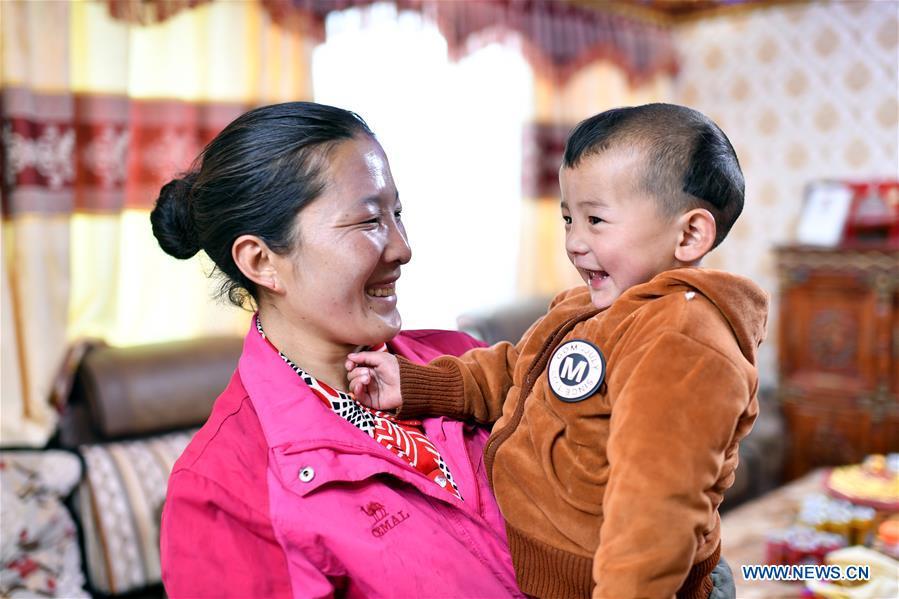
Baimaluozong holds her child at home at the Rongma relocation settlement in Gurum Township of Lhasa, capital of southwest China's Tibet Autonomous Region, April 1, 2020. In 2018, more than 1,000 shepherds moved from Qiangtang grassland with an average altitude of about 5,000 meters in Rongma Township of Nagqu City to the Rongma relocation settlement, 30 kilometers west of Lhasa, thanks to the local policy on poverty alleviation. This measure also makes room for the living of wild animals at the Qiangtang National Nature Reserve. With the help of local government, the relocated people have developed the cultivation industry of yaks and sheep and other special pasture-style projects, thus increasing their incomes. (Xinhua/Zhan Yan)

Oucuo and her son Sonam Pubu work at their restaurant at the Rongma relocation settlement in Gurum Township of Lhasa, capital of southwest China's Tibet Autonomous Region, April 1, 2020. In 2018, more than 1,000 shepherds moved from Qiangtang grassland with an average altitude of about 5,000 meters in Rongma Township of Nagqu City to the Rongma relocation settlement, 30 kilometers west of Lhasa, thanks to the local policy on poverty alleviation. This measure also makes room for the living of wild animals at the Qiangtang National Nature Reserve. With the help of local government, the relocated people have developed the cultivation industry of yaks and sheep and other special pasture-style projects, thus increasing their incomes. (Xinhua/Zhan Yan)
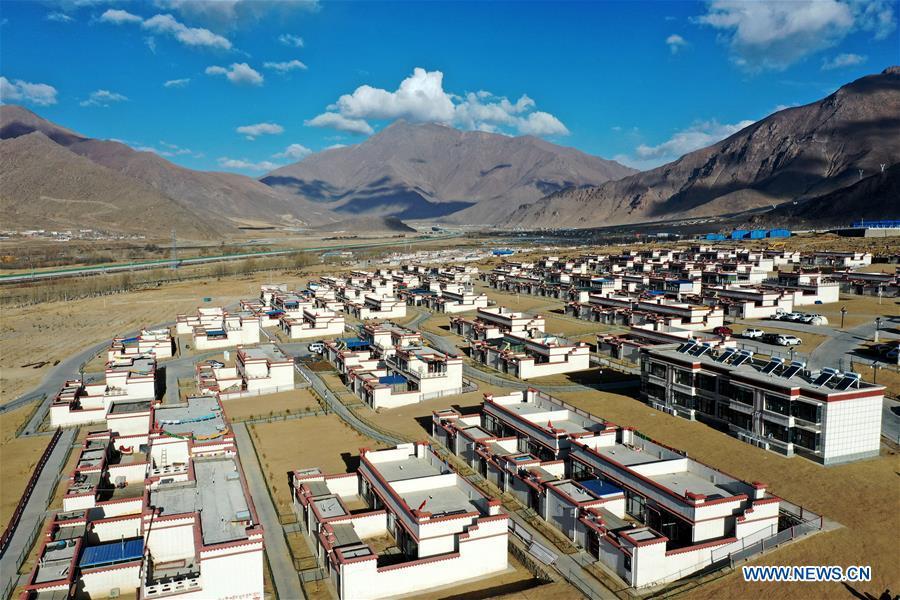
Aerial photo taken on April 2, 2020 shows the Rongma relocation settlement in Gurum Township of Lhasa, capital of southwest China's Tibet Autonomous Region. In 2018, more than 1,000 shepherds moved from Qiangtang grassland with an average altitude of about 5,000 meters in Rongma Township of Nagqu City to the Rongma relocation settlement, 30 kilometers west of Lhasa, thanks to the local policy on poverty alleviation. This measure also makes room for the living of wild animals at the Qiangtang National Nature Reserve. With the help of local government, the relocated people have developed the cultivation industry of yaks and sheep and other special pasture-style projects, thus increasing their incomes. (Xinhua/Zhan Yan)
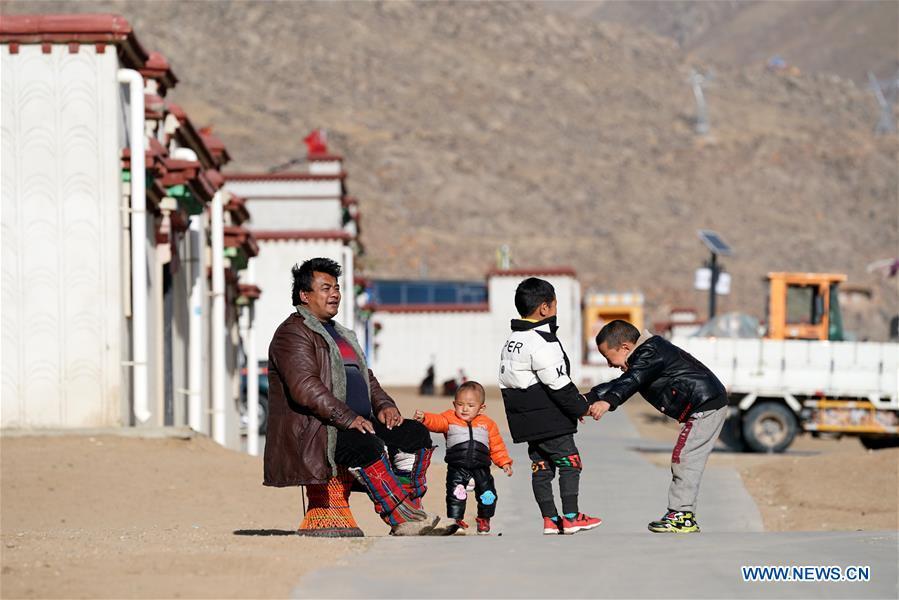
Meiqiong and his children have fun at the Rongma relocation settlement in Gurum Township of Lhasa, capital of southwest China's Tibet Autonomous Region, April 1, 2020. In 2018, more than 1,000 shepherds moved from Qiangtang grassland with an average altitude of about 5,000 meters in Rongma Township of Nagqu City to the Rongma relocation settlement, 30 kilometers west of Lhasa, thanks to the local policy on poverty alleviation. This measure also makes room for the living of wild animals at the Qiangtang National Nature Reserve. With the help of local government, the relocated people have developed the cultivation industry of yaks and sheep and other special pasture-style projects, thus increasing their incomes. (Xinhua/Zhan Yan)
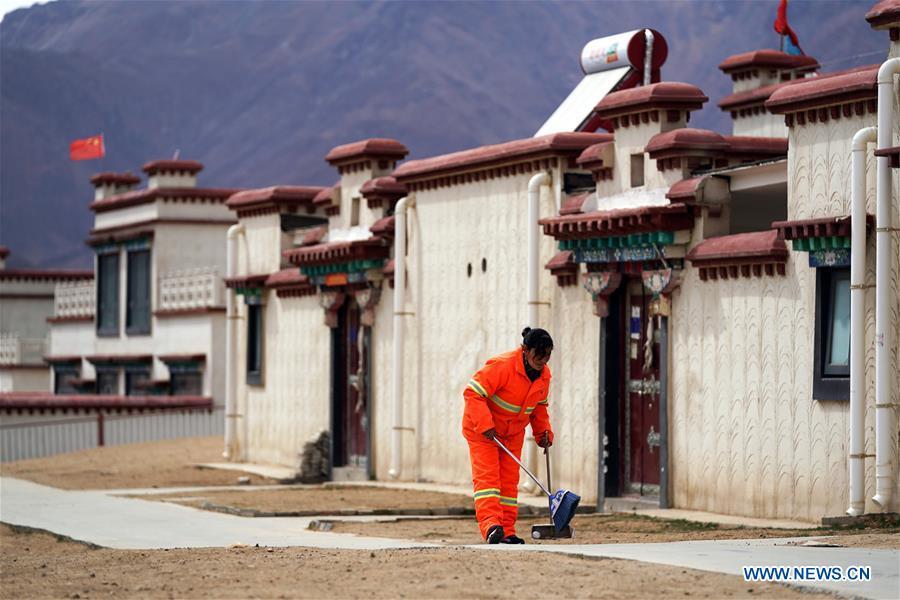
Shixiu Lazhen cleans a road at the Rongma relocation settlement in Gurum Township of Lhasa, capital of southwest China's Tibet Autonomous Region, April 2, 2020. In 2018, more than 1,000 shepherds moved from Qiangtang grassland with an average altitude of about 5,000 meters in Rongma Township of Nagqu City to the Rongma relocation settlement, 30 kilometers west of Lhasa, thanks to the local policy on poverty alleviation. This measure also makes room for the living of wild animals at the Qiangtang National Nature Reserve. With the help of local government, the relocated people have developed the cultivation industry of yaks and sheep and other special pasture-style projects, thus increasing their incomes. (Xinhua/Zhan Yan)










